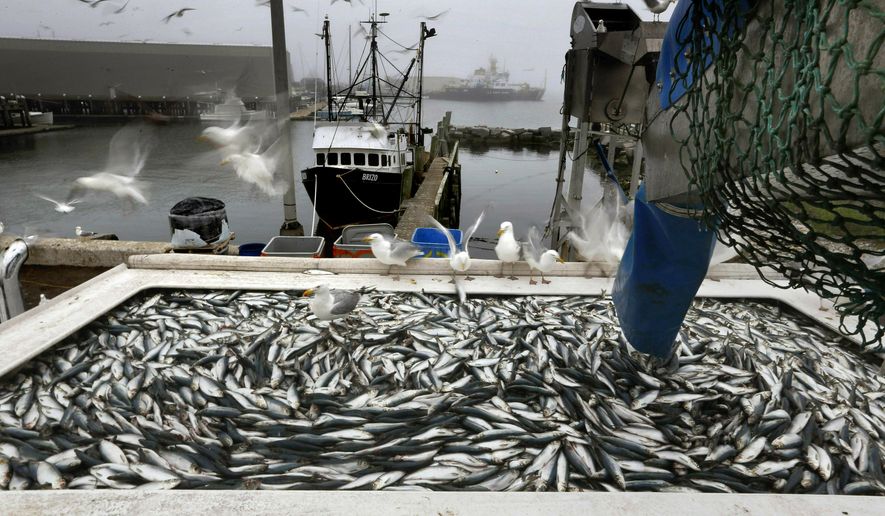It may seem, at first, a parochial dispute. Some herring fishermen say they can’t afford the $700-per-day fee federal regulators want to charge them to have someone ride on their boat and monitor their catch every time they go out into the waters.
Their lawsuit against the Commerce Department could upend much of how the federal government works.
The fishermen will go to the Supreme Court on Wednesday to argue that the Commerce Department’s National Oceanic and Atmospheric Administration has strayed beyond the bounds of the law, which allows monitors but says nothing about making the fishing boats cover the costs.
“There are substantial costs for every fishing trip we take, and if we catch nothing or the catch is small, we can actually lose money. Monitors are paid regardless of the catch, and under this rule they would make more than me and my crew on many trips, which isn’t financially feasible or fair,” said Bill Bright, a New Jersey fisherman and chief plaintiff in the case.
The fishermen lost in a 2-1 decision before a federal appeals court, where the majority said judges must give substantial deference to an agency’s interpretation of a law under the 1984 Supreme Court ruling Chevron v. Natural Resources Defense Council.
If a law is deemed ambiguous but the executive branch’s interpretation is considered “rational” — even if it’s not the most likely way Congress intended — the courts must uphold it.
Mr. Bright’s case asks the justices to overturn Chevron, arguing that judges should have more leeway to limit federal bureaucratic powers.
To its defenders, the Chevron ruling blazed a path to good government by putting federal agency experts in charge of the finer points of policymaking.
To its detractors, Chevron is the stuff of Orwellian dystopias, siphoning massive amounts of political power away from Congress and the courts and turning it over to unelected, anonymous bureaucrats.
The 1984 case has become legendary, less for what it says than for how lower courts have used it to create a presumption in favor of an agency’s decisions. The appeals court in the District of Columbia handles many agency cases.
In the 1984 case, the Natural Resources Defense Council challenged the Environmental Protection Agency’s 1981 change to its definition of the “source” of air pollution in enforcing the 1963 Clean Air Act. The change made it easier for factories to add facilities without going through the EPA review process.
A unanimous Supreme Court ruled in favor of the EPA, saying Congress had given the agency authority to interpret and enforce its policy and that judges should defer to that authority. The ruling reversed a decision by the U.S. Circuit Court of Appeals for the District of Columbia. The Chevron deference doctrine, which requires judges to defer to an agency’s interpretation of a law as long as the interpretation is reasonable, established a critical test in administrative law.
Some legal scholars say Chevron has been dead for some time, with the high court ignoring it when it’s convenient.
Indeed, it has been more than six years since the justices last cited the Chevron deference doctrine in a case, according to a December 2022 article in the Yale Journal on Regulation.
Lower courts still regularly practice Chevron’s deference, leading to a bizarre split between the high court and its subordinates.
The fishermen’s case has drawn more than two dozen amicus briefs. Conservatives have argued for the end of Chevron, and liberal groups have asked the court to keep it in place.
Among the Chevron decision’s supporters is the Natural Resources Defense Council, the losing party in the 1984 case.
In its brief, NRDC said it still disagrees with how the federal government handled the law during its litigation but respects the principle of deference to the administration. It did say the law could clarify to lower courts that they have a “robust” role in policing the agencies.
Justice Neil M. Gorsuch, a Trump appointee, has been eyeing a chance to eliminate Chevron. He argues that the law requires judges to do less deferring and more judging.
It’s unclear whether four other justices are willing to join him in his quest.
The fishermen say their livelihoods depend on the outcome.
Stefan Axelsson is a third-generation commercial fisherman whose great-grandfather immigrated to the U.S. from Sweden and passed down the fishing business to his father and now to him.
“Nobody in a family business wants to be the last one to do it. Everyone wants to pass it along, and my fear is I may not be able to,” Mr. Axelsson said.
Wayne Reichle, president and co-owner of Lund’s Fisheries with his father, is also trying to save the family operation.
“We’ve carried monitors aboard our vessels for decades, and we’re happy to do so to ensure every catch is responsibly harvested. No one has more at stake than we do in the long-term health of these waters, but we don’t believe we should be responsible for covering the monitors’ salaries,” he said.
The Biden administration says the monitors are critical to keeping the oceans healthy and that having the industry fund the program will help conservation efforts.
“Accurate and reliable information about existing conditions in regulated fisheries is important both for determining the appropriate conservation measures to put in place and for ensuring that existing measures are being honored in practice,” U.S. Solicitor General Elizabeth Prelogar wrote in her filing.
The justices combined two cases in the challenge. One is Relentless v. Department of Commerce. The other is Loper Bright Enterprises v. Gina Raimondo, the commerce secretary.
A decision is expected by the end of the court’s term in June.
• Stephen Dinan can be reached at sdinan@washingtontimes.com.
• Alex Swoyer can be reached at aswoyer@washingtontimes.com.





Please read our comment policy before commenting.